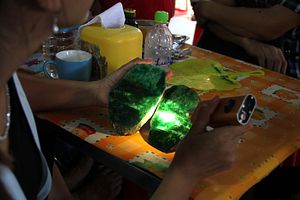In 2015, Naw Aung, a 30-year-old miner from Mogaung Township, watched as the hillside he and his friends were working on started to collapse. An explosion at a nearby jade mine had set the earth shaking, and as stones rained down on the miners, Naw Aung rushed to escape. When the land stopped moving, 14 people were dead, including four of his friends. As Naw Aung tried to dig his companions out of the rubble, other miners ran past him to pick through the stones that had been dislodged by the violence.
“No one helps you when you’re a poor jade miner,” he said. “Everyone has to fend for themselves. The only people that get any help are those that can pay for it. The rich men, they get all the help they want.”
The remote mountains of Kachin state, in Myanmar’s far north, hold the world’s only steady supply of high quality jadeite. The green stone fetches enormous prices on the Chinese market, where it can outprice any gemstone save for colored diamonds. The vast majority of Myanmar’s jade trade is unrecorded and underground, which makes effective governance of the industry very difficult. Independent estimates of the trade’s value vary widely. It is worth somewhere between $8 billion and $40 billion annually. At the low end, this would be more than the yearly budget of Myanmar’s military; at the higher end of the scale, it would account for over half the country’s GDP.
The vast majority of that money goes through secretive and opaque channels controlled by well-connected business elites. Jade’s arbitrary pricing and the fact that much of the trade takes place in a remote, largely ungoverned area make the stone an excellent vehicle for illicit trade and money laundering. Myanmar’s national armed forces, known locally as the Tatmadaw, control most of its flow, while the majority of financing comes from Chinese investors and their affiliates inside Myanmar.
The Kachin Independence Army, or KIA, a rebel group that is engaged in a civil war against the Myanmar government over their right to self-govern, also exerts authority over a sizable portion of the jade stream. Smuggling routes into China traverse KIA territory, where the army can tax traffickers. Some groups allege that both the KIA and the Tatmadaw use their off-the-books jade money to finance the fighting in Kachin state.
































